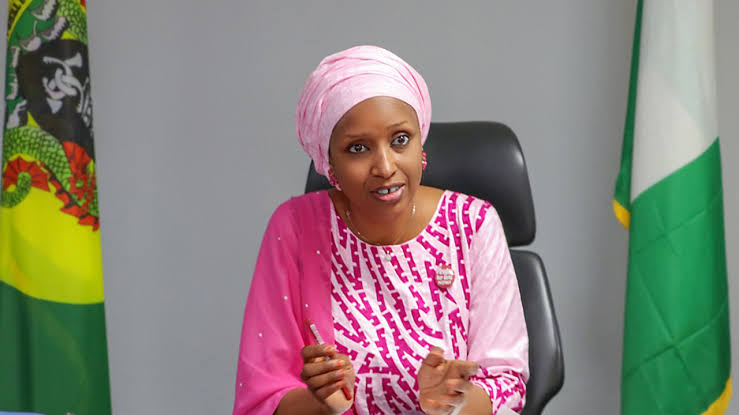Making sense of Hadiza Bala-Usman’s suspension
Although the administrative inquiry into the affairs of the Nigerian Ports Authority (NPA) under the suspended MD is ongoing, it has activated a series of theories. Ms. Hadiza Bala-Usman’s NPA, in a March 4 letter to the President signed by her principal, is accused of failing to remit N165 billion to the nation’s Consolidated Revenue […]

Although the administrative inquiry into the affairs of the Nigerian Ports Authority (NPA) under the suspended MD is ongoing, it has activated a series of theories. Ms. Hadiza Bala-Usman’s NPA, in a March 4 letter to the President signed by her principal, is accused of failing to remit N165 billion to the nation’s Consolidated Revenue Fund account between 2016 and 2020. But Rotimi Amaechi’s outcry that the annual remittances of operating surpluses by the agency are “far short of the amount due for actual remittance,” seems like the sound of a louder scandal, and Nigerians have jumped on it to make sense of the bureaucratic wonder and weave fancy and bizarre conspiracy theories.
Ms. Bala-Usman has been the protagonist of the Nigerian adventure since her appointment, beginning with the termination of the pilotage agreement with Integrated Logistics Services (Intels). The decision took a political turn because of the affiliation of former vice president Atiku Abubakar with the firm then, and the former presidential candidate had to bail out of INTELS to, according to reports, protect it from politically-motivated targeting. Beyond this audacious confrontation are also allegations of Ms. Bala-Usman’s villainy, especially in her alleged preferential treatment of Aliko Dangote through alleged awarding of contracts to proxy companies allegedly affiliated to the richest African. These claims, which have been denied, have made the suspended MD the star of social media scrutiny these past weeks.
- Inside ministers’ many battles with heads of agencies
- Secret behind maintaining a healthy weight loss
The most amusing theory of Ms. Bala-Usman’s travails is the attempt to attribute the suspension to her criticism of Nigeria’s compromised security on Twitter last February. Rattled by the trending abductions of school kids on February 27, 2021, she shared: “The state of insecurity in the country that has led to the kidnap of Kagara boys and Zamfara girls need to be addressed URGENTLY…We can’t go on like this! Rescue our children and Secure our country that’s all we ask …#SecureNorth #SecureNigeria…”. This was unsurprising because she shot to civil society limelight on the back of similar abduction that took place in Chibok, and for which the #BringBackOurGirls campaign was created to keep the Jonathan government on its toes.
As interesting as this theory sounds, it’s unlikely the genesis of Ms. Bala-Usman’s misery. She’s the last person to face a political witch-hunt in this government. She has powerful principals, including the President. They are from the same state, and close. If she’s being investigated, it’s unlikely to be for no reason. She also has on her side an outspoken and ferocious former principal, Governor Nasir El-Rufai, to whom she was Chief of Staff before her appointment. This support system means a political witch-hunt-hunt can’t be the reason she’s under scrutiny.
Ms. Bala-Usman’s suspension is rather a mockery of the Buhari administration, which vetted her for re-appointment barely four months before “finding out” that she could’ve abused her office. It ridicules the process that rewarded her first 5-year tenure, and this validates the anger of the Minister of Transportation, Rotimi Amaechi, said to have been bypassed in her reappointment in various publications and analyses. He’s also accused her of insubordination. That Bala Usman’s trouble was because Amaechi was sidelined in the decision to renew her appointment is a credible theory, but, still, he wouldn’t have risked such a scandalous investigation without a cloud of smoke at all.
At worst, this might be a clash of interests, and it doesn’t mean that Bala-Usman is innocent. At least the panel set up to investigate the claim is the most advantaged to establish the fact of what truly transpired in those four years of contentious transactions. The Cable online newspaper reported an exclusive take on May 12, divulging that the panel had “soft-pedalled”, based on their interpretation of a comment attributed to a member of the panel investigating Bala-Usman. The panel, the member said, set out to punish the suspended MD for insubordination.
But, again, it’s a time of propaganda warfare, and both parties seem to have had their loyalists strutting to nail the other. There’s still no official position of the panel, so we are left with the testimonies of such anonymous or unnamed panel members and friends and allies of the estranged parties. What’s clear, however, is that this isn’t the witch-hunt we are being made to believe. No matter the eventual findings of Amaechi’s panel, there’s still the presidency to acknowledge the cases against Ms. Bala-Usman. So, the question of victimizing her is a misplaced paranoia.
This tradition of rushing to stand in solidarity with a public servant on trial for alleged corruption defeats the essence of the accountability advocated by the public. Ms. Bala-Usman doesn’t need this, and she shouldn’t bother about it if there’s nothing to hide. She’s innocent at this point, and luckily serving a government in which her principals call the shot. One can vouch for the integrity of friends on personal dealings, but public service is a strange world. It’s a hub of criminal temptation, and it’s consumed some of our favourite people. But it’s not yet established that it’s consumed the NPA boss.
The most prominent theory amidst this chaos is the portrayal of the suspension as pushback from the powerful elite on whose toes Bala-Usman has stepped, and in whose interests Amaechi is purportedly at war with the “insubordinate” MD. The next few days shall unravel the exact origin and aim of this in-fighting.
